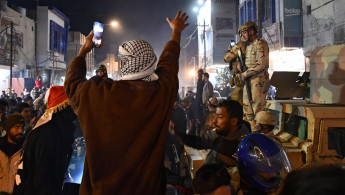4 protesters killed in clashes with Iraq security forces
Protesters have defied a second wave of coronavirus infections and renewed lockdown measures to vent their anger at the government over poor public services.
Similar protests, also over unemployment and corruption, erupted in late 2019 and morphed into an unprecedented anti-government movement across southern Iraq and Baghdad.
But while they faded elsewhere in the country, rallies have continued to grip Nasiriyah.
On Friday, four protesters were shot by security forces, medics in the city told AFP, adding that three died immediately while the fourth later died of gunshot wounds.
"Another 47 people were wounded but the hospitals are all full of coronavirus patients. We're struggling to find places to treat them," one medic said.
Demonstrators have demanded the resignation of governor Nazem al-Waeli and rallied this week outside his office, as they protested against deteriorating public services.
Waeli resigned late Friday in a hand-written letter to Prime Minister Mustafa Al-Kadhemi that was distributed by Iraqi state media.
|
Kadhemi swiftly appointed the head of the National Security Service, Abdulghani Al-Assadi, as temporary governor and created a committee to probe Friday's events.
Protesters had tried to shut down some of the city's main bridges but security forces fired live rounds to disperse the crowds.
'This must end now'
Amnesty International said Friday that it had verified videos of Nasiriyah showing police firing their weapons and protesters lying dead in the streets.
It said wounded people were being treated in parking lots, while others were so afraid of being arrested by security forces if they went to hospitals that they were seeking help elsewhere.
"This must end now," Amnesty wrote on Twitter.
"The Iraqi government has failed time and time again to address the impunity with which protesters are being killed. When will the bloodshed end?" it said.
One protester was killed in similar confrontations on Monday and another on Thursday.
Decades of war, government graft and a dearth of investment have left Iraq's water, electricity and other public works in a pitiful state.
Many households have only a few hours of mains electricity per day and complain of polluted tap water.
Nearly 600 people have been killed in protest-related violence since late 2019, including in mass violence at demonstrations but also in targeted assassinations.
One of the bloodiest incidents was in November 2019 in Nasiriyah, when more than three dozen demonstrators were killed at the city's Zeitun (Olive) Bridge.
The incident sparked outrage across Iraq and prompted the resignation of then-prime minister Adel Abdel Mahdi.
Amid rising political tensions and the spreading coronavirus pandemic, the demonstrations died down across most of Iraq in 2020.
But they have continued to flare up in Nasiriyah, including in November when nine people were killed during a week of violence.
Premier Kadhemi, who is also commander-in-chief of Iraq's armed forces, has repeatedly ordered security forces not to fire on crowds.
He has even ordered the removal of top security officials there but to no avail.
Kadhemi has also pledged to bring the perpetrators of all protest-related violence to justice.
Earlier this month, he announced the arrest of four members of a suspected "cell" that carried out assassinations of activists and journalists seen as sympathetic to the anti-government movement.
The renewed violence comes less than two weeks before Pope Francis is set to visit Dhi Qar province, of which Nasiriyah is the capital, as part of the first-ever papal trip to Iraq.




 Follow the Middle East's top stories in English at The New Arab on Google News
Follow the Middle East's top stories in English at The New Arab on Google News


![A group of Palestinians, foreign and Israeli activists gather to participated in an olive picking event on the land in the town of Battir, which is under threat of confiscation by Israel in Bethlehem, occupied West Bank on 8 November 2024. [Getty]](/sites/default/files/styles/image_330x185/public/2182930803.jpeg?h=199d8c1f&itok=__0LgGsa)